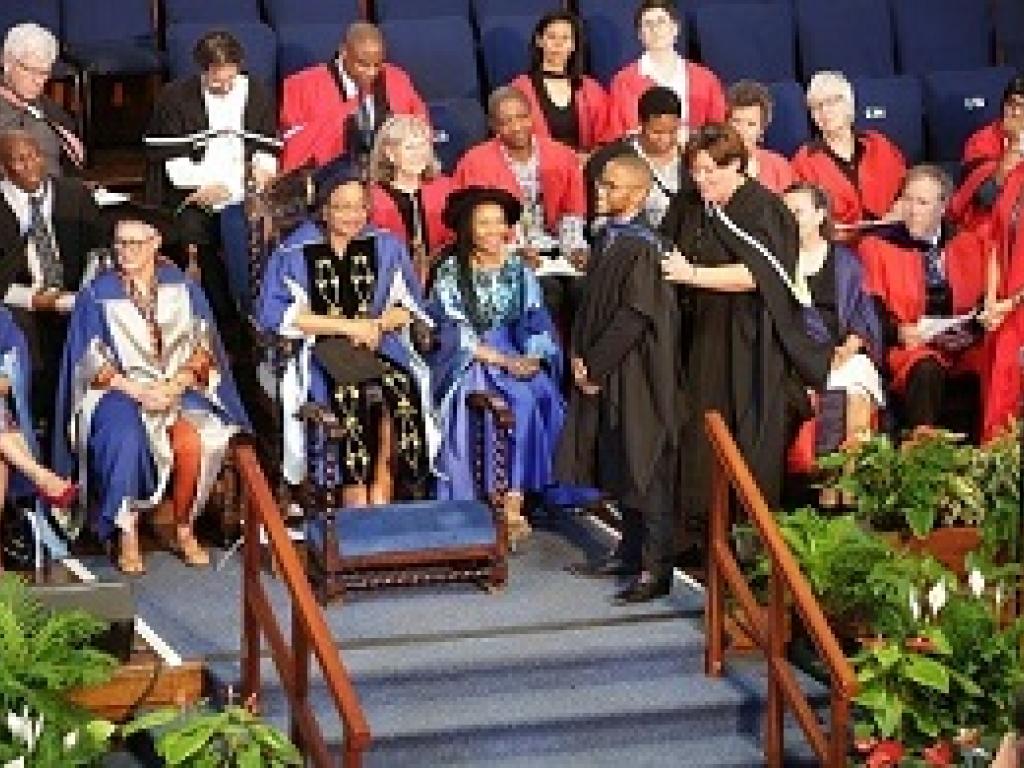Graduates - 2019

A number of Masters and PhD students associated with REEP are due to graduate on 13 December 2019. Below we profile three Masters and three PhD students who have written their theses/dissertations on aspects related to tobacco control policy, across a variety of different countries and regions. Four of the six students have been funded by the African Capacity Building Foundation. We want to acknowledge them, as well as our other funders, whose generous financial support make it possible for REEP to exist. Congratulations to them all!
- Catherine Namome
- Michal Stoklosa
- Abel Otwori Nyagwachi
- Zeenat Ebrahim
- Abdul Gafar Abubakar Masa-ud
- Chipo Rusere
PhD Graduates

Catherine Namome

Thesis Title: The Economics of Tobacco Production and Feasible Alternatives in Uganda
- Supervisor: Professor Corné Van Walbeek (Economics)
- Co-supervisors: Associate Professor Beatrice Conradie (Economics) & Associate Professor Anthony Leiman (Economics)
Catherine holds a BSc in Forestry from Makerere University and MSc (Agric) degree in Agricultural Economics from the University of Pretoria. She joined the School of Economics at UCT in 2014 for her PhD studies. Prior to her joining UCT, she worked as an Agricultural Economist at the Agricultural Research Council.
Catherine’s thesis focuses on Article 17 of the World Health Organisation’s Framework Convention on Tobacco Control, which requires signatory states to promote alternatives to tobacco farming. Accordingly, in 2014 she conducted a farm household survey in the West Nile area to collect data on the economics of tobacco and alternative crops among a representative group of small-scale farmers. The main crops grown in the area are tobacco, coffee, cassava and maize.
She finds that tobacco farming gives poorer returns, having higher costs and requiring more inputs than competing crops. However, farmers integrated into the tobacco marketing system do have easier access to pre-season capital and end of season markets.
She estimates how producers of tobacco leaf respond to differences in the prices of tobacco, cash crops and staple food crops, as well as differences in yields of these products in these products. She finds that although experience and past investments tend to commit farmers to crops they know; they do change their balance of cash crops to increase profitability. However, a further study of farm efficiency finds that subsistence food crops are not viable alternative to tobacco in this region.
Lastly, the study investigates the balance of power across the domestic value chain. By extending pre-season credit, buyers and processors establish a degree of control in a vertically integrated system, and some control over the prices that farmers receive for their crops. The system encourages a situation where tobacco-specialised farms tend to be over-capitalised and suffer from inefficient management practices.

Michal Stoklosa

Thesis Title: Effects of the Evolving Global Tobacco Product Landscape on Smokers' Switching Behaviours
- Supervisor: Professor Corné an Walbeek
- Co-supervisor: Dr. Jeffrey Drope (American Cancer Society)
Michal is Principal Scientist (Taxation and Health) in the Economic and Health Policy Research Programme at the American Cancer Society. Before joining UCT for his PhD studies, he received an MA in Managerial Economics from the University of Warsaw and an MA in Economics from Georgia State University.
Governments have increasingly used excise tax to reduce tobacco use. Smokers respond to the tax-driven price increases by quitting, reducing consumption, or by switching to alternatives. Michal Stoklosa’s thesis analyses three aspects of tobacco product switching. First, he uses 2012 and 2014 data from the ITC Zambia survey to model price-driven substitution. He finds that reducing between-product price differences would reduce substitution from cigarettes to roll-your-own tobacco.
Second, he uses 2014-2018 monthly retailer panel data from Japan to show that traditional cigarette sales trends changed significantly when a novel tobacco product, IQOS, was introduced. Thus, between-product switching is influenced by the new product’s introduction.
Finally, he uses 2004-2017 European Commission data to demonstrate that differences in cigarette prices between jurisdictions might incentivize some smokers from jurisdictions with more expensive cigarettes to switch to cheaper cigarettes available across the border. These findings are useful for policymakers looking to regulate tobacco markets.

Abel Otwori Nyagwachi

Thesis Title: Essays on the economics of tobacco and alcohol control policies in Kenya
- Supervisor: Professor Corné van Walbeek
- Co-supervisor: Doctor Grieve Chelwa
Abel holds a BA in Economics and Master of Economics Degree from Kenyatta University, Kenya. He joined UCT in 2015 for his PhD studies. Before joining UCT he worked as an Economist at the National Treasury, Kenya and the Parliamentary Budget Office, Kenya.
Abel Nyagwachi’s thesis uses data from two household and budget surveys (2005/6 and 2015/16), to examine some effects of the tobacco- and alcohol-control policies that were implemented in Kenya between 2005 and 2015. He finds that tobacco- and alcohol-consuming households spend less on necessities such as food, healthcare and education. He also finds that tobacco- and alcohol-control polices contributed to a decline in the prevalence of child malnutrition in tobacco and alcohol consuming households. An increase in the price of cigarettes reduces the demand for cigarettes, other tobacco products and some stimulants. An increase in the price of beer increases the demand for informally-produced alcohol. Tobacco- and alcohol-control policies contributed to a reduction in tobacco and alcohol budget shares in the poorest households.
Masters Graduates
Zeenat Ebrahim
Thesis Title: The Recent Spike in Illicit Tobacco Trade in South Africa
- Supervisor: Professor Corné van Walbeek
Zeenat holds a BCom Honours in Economics from the University of South Africa and will be getting her Master’s degree in Economic Development from UCT in December 2019. Before joining UCT she worked as a Senior Research Analyst at Euromonitor International.
Zeenat’s thesis explores the upward spike in the illicit tobacco trade observed in South Africa since 2015. She uses data from semi-structured key informant interviews in order to assess whether or not a relationship exists between tobacco companies’ actions and the spike in illicit activity. She finds that the tobacco industry as a whole is using a variety of tactics to protect their interests. She also finds that the recent increase in the illicit tobacco trade is the result of an increase in under-declared cigarette production by the tobacco industry, which exploits weak enforcement of the excise tax on cigarettes.

Abdul Gafar Abubakar Masa-ud

Thesis Title: Crowding-Out of Household Expenditure by Tobacco in Ghana
- Supervisor: Professor Corné van Walbeek
Abdul holds a Bachelors degree from the University of Ghana in Economics and Psychology. Before joining UCT for his Masters in Economic Development, he worked as a Research Assistant at the Parliament of Ghana.
Households that spend money on tobacco, have to give up something else. Based on numerous other studies, tobacco use often crowds out expenditures on education, and foodstuffs that are often consumed by children, like milk. In cases like these, tobacco thus contributes to an intergenerational cycle of poverty, where children of smoking parents are more likely to experience hardship than children of non-smoking parents. Abdul’s thesis considered the crowding out effects of tobacco in Ghana.
Abdul showed that, like many other countries, the introduction of tobacco control policies was associated with a reduction in tobacco consumption in Ghana. In the absence of panel datasets, this thesis used two cross sectional datasets in 2005/2006 and 2012/2013 to investigate whether tobacco’s crowding-out of other household expenditure had changed, taking into consideration the introduction of a major tobacco control law in Ghana in July, 2012.
To do this, Abdul estimated a system of quadratic conditional Engel curves for a set of eleven groups of commodities for both periods and compared the magnitude of crowding-out of household expenditure in both periods. The results showed a crowding-out of food, alcohol, clothing and transport and a crowding-in of furnishings, health and communication expenditure by tobacco. The magnitude of crowding-in and crowding-out declined over the period under study.

Chipo Rusere

Thesis Title: Tobacco Control in Zimbabwe and the WHO Framework Convention on Tobacco Control WHO FCTC): State of Affairs
- Supervisor: Professor Corné Van Walbeek (Economics)
- Co Supervisor: Dr. Catherine Egbe (South African Medical Research Council)
Chipo joined UCT in 2017 for a Master’s degree in Economic Development. Before this, she was based in Zimbabwe and managed projects in financial inclusion for small-scale farmers. Since completing her Master’s degree in Economic Development, she has enrolled for a second Master’s degree, namely in Climate Change and Sustainable Development. Concurrently, Chipo is a Project Coordinator for a Cape Town-based sustainable development consultancy.
For her Master’s degree in Economic Development, Chipo investigated the challenges for Zimbabwe, a country largely dependent on tobacco production, in meeting its obligations according to the WHO’s Framework Convention on Tobacco Control (FCTC). The country is conflicted between balancing the promotion of health (which implies producing less tobacco), and maintaining the gains from tobacco exports (which implies producing more tobacco). Her research was intended to inform national initiatives to build capacity around the effective implementation of the FCTC in Zimbabwe.
Zimbabwe’s government has, in the past, expressed opposition to the WHO FCTC. It has also not implemented some of the provisions and has in fact acted contrary to those provisions. For example, since the country’s ratification of the treaty in 2014, the government has incentivised tobacco production, contrary to the treaty’s provisions.
This study made use of semi-structured interviews with key informants, supplemented by a situation analysis examining government efforts to align existing tobacco-control legislation with the WHO FCTC. Results show that Zimbabwe’s existing tobacco-control legislation was biased because of interference by the tobacco industry during the early stages of drafting the bill. There is no prioritisation of tobacco-control efforts by government. Accession to the WHO FCTC appears to have been an opportunity to present the country’s concerns, particularly those relating to the supply-side provisions of the WHO FCTC, and possibly disrupting WHO FCTC efforts to limit tobacco-industry interference and advance global tobacco-control efforts.
